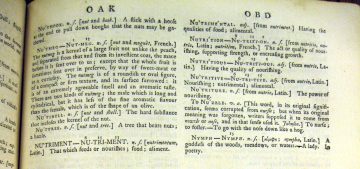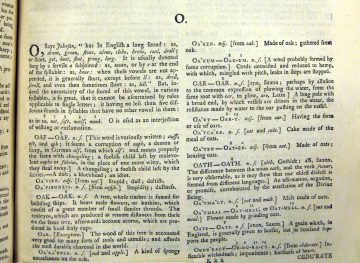For this week’s student dictionary report from the course English 320: History of the English Language…a tale of a particularly roguish lexicographer:
Kenrick, William. A New Dictionary of the English Language. London: Printed for J. and F. Rivington, W. Johnston, T. Longman, and T. Cadell, 1773. PE25 .R62 V. 206
Writer William Kenrick was born in 1725 in Hertfordshire, England. In his literary career, Kenrick began writing short pamphlets and articles for the monthly journal The Kapelion. He was also a self-proclaimed but unsuccessful satirist who enjoyed mocking other writers in his work. He took pleasure in his victims’ rebuttals and gladly wrote his own replies to himself when others ignored his insults. Though he delighted in attacking his peers in print and often wrote with animosity, Kenrick was a rather jovial character in person, though a pest to his colleagues. He has been described as “one of London’s most despised, drunken, and morally degenerate hack writers in the later eighteenth century” (Fussell).
Though his literary style was impressive, Kenrick could not attain the respected status of many of his peers. James Boswell noted that he “wrote with so little regard to decency and principles, and decorum, and in so hasty a manner, that his reputation was neither extensive nor lasting” (Boswell). Kenrick repeatedly condemned the work of Samuel Johnson, evoking an academic conflict between the two writers. Despite identifying the flaws of Johnson’s publications, Kenrick used much of Johnson’s work regarding pronunciation guides to include in his New Dictionary of the English Language in 1773. In many cases, the extractions were reproduced without changes. He also pursued editing and publishing endeavors and became the editor-in-chief for the London Review of English and Foreign Literature (Rogers and Rizzo). In his final years, Kenrick remarried twice and spent time in Fleet prison for debt. He died of unidentifiable causes in 1779.
As a final attempt to antagonize Samuel Johnson, Kenrick wrote A New Dictionary of the English Language, published in London in 1773. The new dictionary most notably introduced a new system of guiding pronunciation that includes numbers and accents to represent the pronunciation and stressed syllables of words. Thomas Sheridan developed but had not yet published this scheme, so Kenrick once again plagiarized to gain success and insult his peers. The dictionary also includes the section “Rhetorical Grammar,” which was published in London and Philadelphia in 1784. This section analyzes the various grammars and uses of the English language. The entries in this dictionary have similarities to modern English dictionaries, including etymological information and the aforementioned phonetic guide, though Kenrick occasionally includes biased witticisms to illustrate certain terms. Though some of the lexicon has changed in present day English based on context and modern technologies, this dictionary well represents a core vocabulary that applies to both the 18th century and the present.
— Jessica Shaw (English 320: History of the English Language, 2012-2013)

